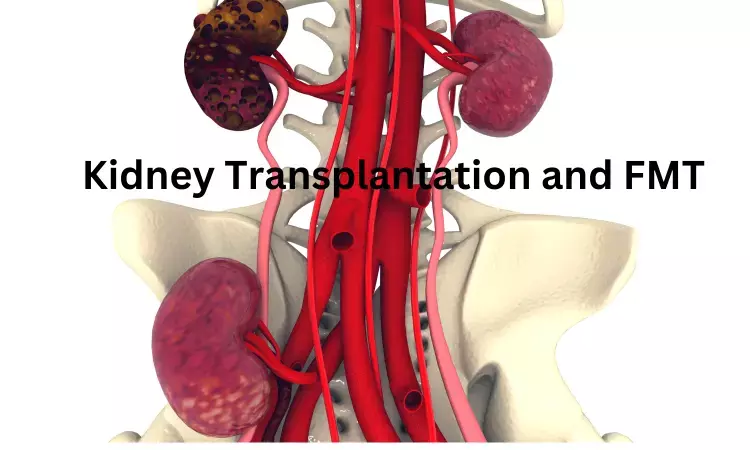- Home
- Medical news & Guidelines
- Anesthesiology
- Cardiology and CTVS
- Critical Care
- Dentistry
- Dermatology
- Diabetes and Endocrinology
- ENT
- Gastroenterology
- Medicine
- Nephrology
- Neurology
- Obstretics-Gynaecology
- Oncology
- Ophthalmology
- Orthopaedics
- Pediatrics-Neonatology
- Psychiatry
- Pulmonology
- Radiology
- Surgery
- Urology
- Laboratory Medicine
- Diet
- Nursing
- Paramedical
- Physiotherapy
- Health news
- Fact Check
- Bone Health Fact Check
- Brain Health Fact Check
- Cancer Related Fact Check
- Child Care Fact Check
- Dental and oral health fact check
- Diabetes and metabolic health fact check
- Diet and Nutrition Fact Check
- Eye and ENT Care Fact Check
- Fitness fact check
- Gut health fact check
- Heart health fact check
- Kidney health fact check
- Medical education fact check
- Men's health fact check
- Respiratory fact check
- Skin and hair care fact check
- Vaccine and Immunization fact check
- Women's health fact check
- AYUSH
- State News
- Andaman and Nicobar Islands
- Andhra Pradesh
- Arunachal Pradesh
- Assam
- Bihar
- Chandigarh
- Chattisgarh
- Dadra and Nagar Haveli
- Daman and Diu
- Delhi
- Goa
- Gujarat
- Haryana
- Himachal Pradesh
- Jammu & Kashmir
- Jharkhand
- Karnataka
- Kerala
- Ladakh
- Lakshadweep
- Madhya Pradesh
- Maharashtra
- Manipur
- Meghalaya
- Mizoram
- Nagaland
- Odisha
- Puducherry
- Punjab
- Rajasthan
- Sikkim
- Tamil Nadu
- Telangana
- Tripura
- Uttar Pradesh
- Uttrakhand
- West Bengal
- Medical Education
- Industry
Fecal microbiota transplantation reduces resistant bacteria colonization in kidney transplant recipients

Bacterial infections are a greater threat as they are most common causes of morbidity and mortality worldwide. Multi-drug resistant organisms (MDROs) represent an ever-increasing share of causative agents of infection, and their prevalence is now just as high. Multidrug-resistant organism (MDRO) colonization is a fundamental challenge in antimicrobial resistance.
Very few studies report about efficacy of fecal microbiota transplantation (FMT), and reduction in MDRO colonization, where not much is known about its mechanisms. A new trial published in Science Translational Medicine reports that FMT may provide a path to exploit strain competition to reduce MDRO colonization. It is known kidney transplant patients are at high risk for MDRO colonization and infection, as they receive prophylactic antibiotics after transplant, which can select for MDROs. They are thus a priority for decolonization, because many of the antibiotics used to treat MDRO infections are nephrotoxic.
The researchers conducted a randomized, controlled trial of FMT for MDRO decolonization in renal transplant recipients called PREMIX (NCT02922816). A total of 11 participants were enrolled and randomized 1:1 to FMT or an observation period followed by delayed FMT if stool cultures were MDRO positive at day 36. Participants who were MDRO positive after one FMT were treated with a second FMT. At last visit, eight of nine patients who completed all treatments were MDRO culture negative. FMT-treated participants had longer time to recurrent MDRO infection versus PREMIX-eligible controls who were not treated with FMT.
The key findings of the study are
• Key taxa of microbes (Akkermansia muciniphila, Alistipes putredinis, Phocaeicola dorei, Phascolarctobacterium faecium, Alistipes species, Mesosutterella massiliensis, Barnesiella intestinihominis, and Faecalibacterium prausnitzii) from the single feces donor was used in the study.
• They engrafted the above combination of feces in recipients and metabolites such as short-chain fatty acids and bile acids in FMT-responding participants uncovered leads for rational microbiome therapeutic and diagnostic development.
• Metagenomic analyses revealed a previously unobserved mechanism of MDRO eradication by conspecific strain competition in an FMT-treated subset.
• Susceptible Enterobacterales strains that replaced baseline extended-spectrum β-lactamase–producing strains were not detectable in donor microbiota manufactured as FMT doses but in one case were detectable in the recipient before FMT.
• These data suggest that FMT may provide a path to exploit strain competition to reduce MDRO colonization.
Researchers concluded that FMT resulted in faster MDRO decolonization and protected study participants from recurrent infection. In some participants, extended spectrum β-lactamase (ESBL)–producing strains were replaced by non-ESBL strains, suggesting that strain competition rather than eradication may occur after FMT.
Further they added these findings support the efficacy of FMT and provide valuable insights into the mechanisms by which FMT may lead to MDRO decolonization.
Reference: MICHAEL H. WOODWORTH , ROTH E. CONRAD, MARINA HALDOPOULOS et al; Fecal microbiota transplantation promotes reduction of antimicrobial resistance by strain replacement; SCIENCE TRANSLATIONAL MEDICINE, 1 Nov 2023 Vol 15, Issue 720; DOI: 10.1126/scitranslmed.abo2750.
MSc. Neuroscience
Niveditha Subramani a MSc. Neuroscience (Faculty of Medicine) graduate from University of Madras, Chennai. Ambitious in Neuro research having worked in motor diseases and neuron apoptosis is interested in more of new upcoming research and their advancement in field of medicine. She has an engrossed skill towards writing and her roles at Medical dialogue include Sr. Content writer. Her news covers new discoveries and updates in field of medicine. She can be reached at editorial@medicaldialogues.in
Dr Kamal Kant Kohli-MBBS, DTCD- a chest specialist with more than 30 years of practice and a flair for writing clinical articles, Dr Kamal Kant Kohli joined Medical Dialogues as a Chief Editor of Medical News. Besides writing articles, as an editor, he proofreads and verifies all the medical content published on Medical Dialogues including those coming from journals, studies,medical conferences,guidelines etc. Email: drkohli@medicaldialogues.in. Contact no. 011-43720751


